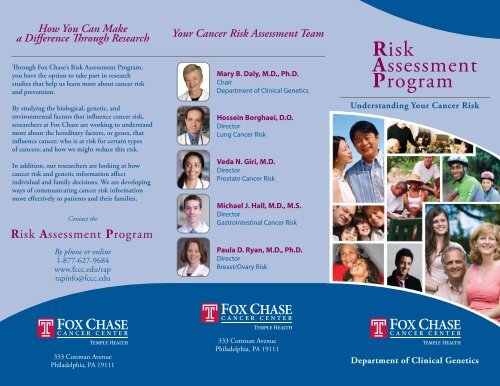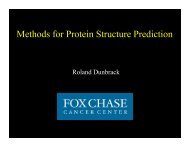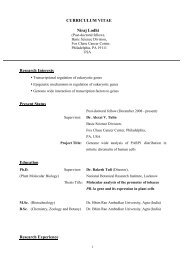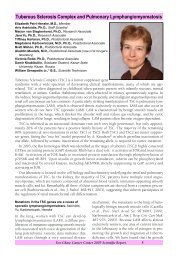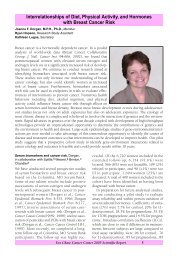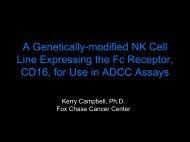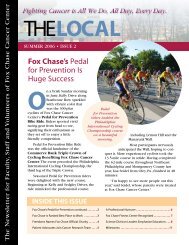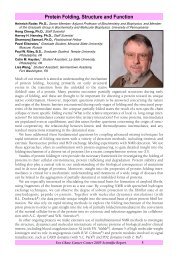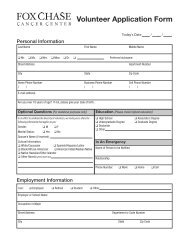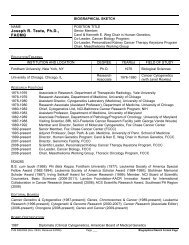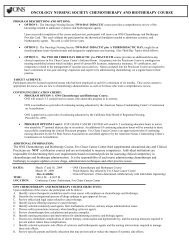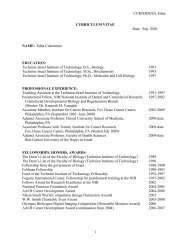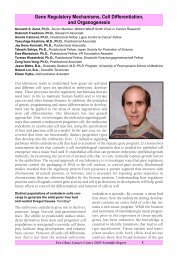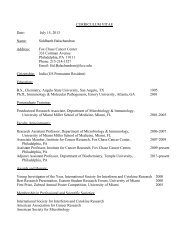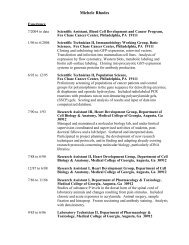Risk Assessment Program - Fox Chase Cancer Center
Risk Assessment Program - Fox Chase Cancer Center
Risk Assessment Program - Fox Chase Cancer Center
Create successful ePaper yourself
Turn your PDF publications into a flip-book with our unique Google optimized e-Paper software.
How You Can Make<br />
a Difference Through Research<br />
Through <strong>Fox</strong> <strong>Chase</strong>’s <strong>Risk</strong> <strong>Assessment</strong> <strong>Program</strong>,<br />
you have the option to take part in research<br />
studies that help us learn more about cancer risk<br />
and prevention.<br />
By studying the biological, genetic, and<br />
environmental factors that influence cancer risk,<br />
researchers at <strong>Fox</strong> <strong>Chase</strong> are working to understand<br />
more about the hereditary factors, or genes, that<br />
influence cancer; who is at risk for certain types<br />
of cancers; and how we might reduce this risk.<br />
In addition, our researchers are looking at how<br />
cancer risk and genetic information affect<br />
individual and family decisions. We are developing<br />
ways of communicating cancer risk information<br />
more effectively to patients and their families.<br />
Contact the<br />
<strong>Risk</strong> <strong>Assessment</strong> <strong>Program</strong><br />
By phone or online<br />
1-877-627-9684<br />
www.fccc.edu/rap<br />
rapinfo@fccc.edu<br />
333 Cottman Avenue<br />
Philadelphia, PA 19111<br />
Your <strong>Cancer</strong> <strong>Risk</strong> <strong>Assessment</strong> Team<br />
Mary B. Daly, M.D., Ph.D.<br />
Chair<br />
Department of Clinical Genetics<br />
Hossein Borghaei, D.O.<br />
Director<br />
Lung <strong>Cancer</strong> <strong>Risk</strong><br />
Veda N. Giri, M.D.<br />
Director<br />
Prostate <strong>Cancer</strong> <strong>Risk</strong><br />
Michael J. Hall, M.D., M.S.<br />
Director<br />
Gastrointestinal <strong>Cancer</strong> <strong>Risk</strong><br />
Paula D. Ryan, M.D., Ph.D.<br />
Director<br />
Breast/Ovary <strong>Risk</strong><br />
333 Cottman Avenue<br />
Philadelphia, PA 19111<br />
<strong>Risk</strong><br />
<strong>Assessment</strong><br />
<strong>Program</strong><br />
Understanding Your <strong>Cancer</strong> <strong>Risk</strong><br />
Department of Clinical Genetics
Pioneers in<br />
<strong>Cancer</strong> <strong>Risk</strong> and Prevention<br />
A leader in cancer prevention and risk assessment,<br />
Dr. Mary Daly at <strong>Fox</strong> <strong>Chase</strong> <strong>Cancer</strong> <strong>Center</strong><br />
established one of the fi rst risk assessment programs<br />
in the country in 1991 for individuals with a family<br />
history of breast and/or ovarian cancer. Th is program<br />
served as a model for others around the country and<br />
led to risk assessment services at <strong>Fox</strong> <strong>Chase</strong> for other<br />
types of cancers, such as prostate, gastrointestinal,<br />
and melanoma.<br />
Today, our Department of Clinical Genetics<br />
builds on this pioneering spirit to off er the most<br />
comprehensive risk assessment program in the<br />
Philadelphia region. It encompasses all of<br />
<strong>Fox</strong> <strong>Chase</strong>’s clinical services for people at risk for<br />
cancer, as well as innovative research in<br />
the areas of cancer prevention and genetics.<br />
Getting started<br />
To learn about your cancer risk and how you can<br />
benefi t from the <strong>Risk</strong> <strong>Assessment</strong> <strong>Program</strong> at<br />
<strong>Fox</strong> <strong>Chase</strong>, contact us by phone or online.<br />
1-877-627-9684 | www.fccc.edu/rap<br />
rapinfo@fccc.edu<br />
Call for more information about:<br />
• genetic counseling/testing<br />
• cancer risk screening clinic<br />
How We Can Help You Clues to Hereditary <strong>Cancer</strong><br />
The risk assessment process<br />
Our risk assessment team—physicians, nurses,<br />
and genetic counselors—can help you determine<br />
your chances of getting cancer and whether you<br />
are at high risk for certain types of cancers.<br />
Th e risk assessment process involves:<br />
• A review of your personal medical history<br />
• A review of your family history of cancer<br />
• A review of genetic risk information<br />
• Genetic testing if appropriate<br />
• A personalized plan based on your cancer risk<br />
Ongoing Education<br />
We off er an online education program to give<br />
you the most up-to-date information about risk<br />
for various types of cancers. All participants<br />
are encouraged to visit this site prior to their<br />
appointment.<br />
On this website you can:<br />
• Complete your family and medical history<br />
questionnaires<br />
• Learn what to expect at your appointment<br />
• See why your family history is so important<br />
• Watch video clips of our physicians and<br />
patients<br />
• Obtain information on cancer risk<br />
Comprehensive care<br />
As a <strong>Risk</strong> <strong>Assessment</strong> <strong>Program</strong> participant,<br />
you may choose to attend one of our cancer risk<br />
screening clinics. Your care with a risk assessment<br />
specialist might include a clinical exam and routine<br />
screenings.We will monitor changes in your<br />
personal and family health histories. You will also<br />
receive risk assessment updates and research news<br />
with our Prevention Matters newsletter.<br />
Certain patterns within families may be clues to<br />
hereditary cancer. Some of these clues within<br />
families include:<br />
• <strong>Cancer</strong> diagnosed at an early age (under 50)<br />
• Rare cancer diagnosis<br />
(Example: male breast cancer)<br />
• Two or more relatives with the same type<br />
of cancer (on the same side of the family)<br />
• Family members who have had more than<br />
one type of cancer<br />
• Family members who have had multiple<br />
colon polyps<br />
• Certain ethnic or racial backgrounds<br />
Genetic testing and counseling<br />
Genetic testing is available for certain types of<br />
cancers, and may help determine if your cancer<br />
risk is hereditary (passed down through the genes).<br />
In addition, we provide genetic counseling to help<br />
you and your family understand and cope with an<br />
inherited risk of cancer.


